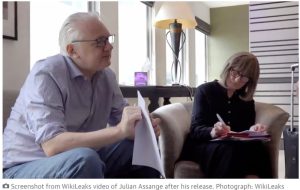Europe: One Step Forward, Two Steps Back on Torture Collusion
http://onesmallwindow.wordpress.com
At the end of 2012, it looked as though the tide was finally starting to turn on European states that colluded in the CIA’s extralegal “extraordinary rendition” programme when, for the first time, European and domestic courts found states guilty of collusion in the abduction, torture and illegal detention of individuals suspected of involvement in terrorist activity.
The CIA’s secretive extraordinary rendition programme involves the “transfer, without legal process, of a detainee to the custody of a foreign government for purposes of detention and interrogation”. Its use accelerated after 11 September 2001 and depends on facilitation by other states. A 2013 report by the US NGO Open Society Foundation (OSF) listed 25 European states out of 54 known to have assisted the programme in different ways.
Europe: One Step Forward, Two Steps Back on Torture Collusion
http://onesmallwindow.wordpress.com
At the end of 2012, it looked as though the tide was finally starting to turn on European states that colluded in the CIA’s extralegal “extraordinary rendition” programme when, for the first time, European and domestic courts found states guilty of collusion in the abduction, torture and illegal detention of individuals suspected of involvement in terrorist activity.
The CIA’s secretive extraordinary rendition programme involves the “transfer, without legal process, of a detainee to the custody of a foreign government for purposes of detention and interrogation”. Its use accelerated after 11 September 2001 and depends on facilitation by other states. A 2013 report by the US NGO Open Society Foundation (OSF) listed 25 European states out of 54 known to have assisted the programme in different ways.
This collusion inevitably involved a serious violation of states’ human rights obligations under international, European and domestic laws. There is an absolute prohibition on torture, a crime against humanity, across Europe. There are no exceptions, not even for terrorism, which is neither a new or recent phenomenon across the continent.
While states have remained intransigent and refuse to break their deafening silence, at all other levels, from the supranational to the judicial and civil society, efforts have been made to disclose the truth and ensure accountability and transparency in the interest of the public and victims.
Top Down…
The European Parliament adopted a report into the issue in early 2007 in which it mentioned that over 1250 CIA torture flights had passed through European Union territory and used its airport facilities between 2001 and 2005 alone. It criticised the failure of many member states and the Council of the European Union to cooperate. Its recommendations appear to have fallen on deaf ears.
On 11 September 2012, the European Parliament updated its previous reports and passed a resolution calling for accountability, demanding member states take action and set up guidelines within one year. A year later, “highly disappointed” but undeterred by the lack of response, the European parliament drafted a new motion for a resolution in September 2013, incorporating more recent issues such as “the mass spying activities of the US National Security Agency surveillance programme.”
Some individual Members of the European Parliament, such as Ana Gomes MEP from Portugal have carried out their own investigations. Ms Gomes’ investigations, securing flight logs to and from Guantánamo Bay, showed that many flights went through Portuguese territory. Journey of Death, a 2008 report by Reprieve, provides flight details and the names of over 700 individuals known to have been flown through Portugal in rendition flights. Her investigation led the Portuguese General Prosecutor’s Office to start a criminal investigation in 2007; this was, however, closed on the “grounds of insufficient evidence” in 2009. Ms Gomes appealed this decision, but it was rejected.
In 2006, the Council of Europe (CoE), Europe’s 47-member human rights body, issued an instructive report in which Swiss senator Dick Marty described the programme as a “global spider’s web” of secret prisons, shedding light on collusion by European states. In 2013, Nils Muižnieks, the CoE Commissioner for Human Rights marked the twelfth anniversary of the 9/11 attacks by reflecting “on the anti-terrorist response adopted by the USA and Europe” and called for accountability and European states involved in extraordinary rendition to “lift the veil of secrecy”.
…And Bottom Up
On the opposite side of the spectrum, grass roots civil society activists have also played their role. Many of the “torture” flights into and out of airports, such as Prestwick in Glasgow, were recorded by planespotters.
The most active grass roots organisation on the issue in Europe is the Irish peace and human rights organisation Shannonwatch, which monitors US military use of Shannon Airport in the west of Ireland, where it reports more than 20 military flights continue to use the airport every week.
Activists have recorded details and flights logs of suspicious aircraft and have requested their inspection, which has been refused. Records put together by activists and human rights NGOs have been presented to the police and government but no investigation has been carried out. Instead the Irish government has chosen to rely on US government assurances – without the slightest verification – that aircraft are not used for this purpose. In 2011, the UN Committee Against Torture also criticised Ireland’s failure to investigate.
The overwhelming evidence and reports from both local and international sources has not prompted the Irish government to act in any way. Neither has it deterred activists from continuing to monitor, protest monthly at the airport and demand an investigation.
In January 2014, a judge handed a 3-month suspended sentence to 79-year activist Margaretta D’Arcy, who suffers from cancer, for a peaceful action on the runway at Shannon in October 2012. The sentence was on condition that she signs a bond not to enter the restricted areas of Shannon Airport, which she refused to do, and as a result she was imprisoned. Instead of investigating and trying those responsible for the commission and facilitation of war crimes, the Irish government has instead jailed someone who highlighted these crimes.
This move, however, may have backfired: Ms D’Arcy is a longstanding and respected peace and human rights activist. It has raised the profile and awareness of the use of Shannon Airport for rendition flights and drone attacks. Many international solidarity protests have been held as well. Meanwhile the military use of the airport continues, according to Shannonwatch.
“The peaceful demonstrations at the airport are going to continue every month, for as long as it takes to get the war planes out of Shannon” said Shannonwatch’s John Lannon. “Margaretta D’Arcy’s principled and conscientious stand has given activists renewed energy, but the mainstream media by and large ignores the very serious issue of Irish complicity in illegal wars. The police do not investigate the State’s complicity, and the Irish army even provides support for the US military at Shannon nowadays. We cannot – and we will not – allow that to continue.”
Domestic courts
Some states have refused to investigate entirely, while others have carried out inconclusive and incomplete investigations. WikiLeaks revealed that a 2007 decision by the German government not to pursue the extradition of 13 former CIA agents wanted for the 2003 rendition of a German citizen, following the issue of arrest warrants by prosecutors earlier that year, was largely due to pressure by the US authorities.
WikiLeaks cables also revealed a judicial inquiry in Spain was pressurised to cease by the US authorities. Partly as a result, Spain is currently in the process of curbing its use of universal jurisdiction to try crimes against humanity, such as torture, regardless of where they were committed. British-US relations were cited in December 2013 when the UK High Court rejected a claim to sue the UK government by a Libyan victim, Abdel Hakim Belhadj and his family, who were rendered to torture from Southeast Asia to Gaddafi’s Libya through British and US collusion.
The judicial breakthrough came in 2009 in Italy when a court convicted 23 Americans (22 of whom were CIA agents) in absentia for their involvement in the 2003 kidnap and “rendition” to torture in Egypt of Milan-based imam Osama Moustafa Hassan Nasr. With the help of Italian intelligence officers, he was kidnapped and taken to Egypt via Germany, where he was held incommunicado and tortured for 14 months. He was released and later detained, until 2007, at various prisons in Egypt. This judgment was upheld in September 2012 by Italy’s Supreme Court.
Robert Selden Lady, a former CIA chief, was one of the officers convicted in absentia and given a 9-year sentence. In July 2013, he learned that domestic laws have consequences when he was arrested under an international arrest warrant pending extradition to Italy while in Panama. He was, however, released and managed to return to the US before the extradition paperwork came through. He has since asked Italy for a pardon, realising he could be extradited at any time when outside of the US. He claims that he had been told that what he was doing at the time was legal.
In February 2013, a further three CIA agents and five Italians were convicted in the case. Nasr and his wife currently also have a pending case against the government of Italy (Nasr and Ghali v Italy) under Article 3 (prohibition on torture), Article 5 (right to liberty and security), Article 8 (right to respect for private and family life) and Article 13 (right to an effective remedy) of the European Convention on Human Rights.
Showing that there are legal ways of doing things, in December 2013, an Italian court convicted Nasr in absentia to six years in prison on terrorism charges he was under investigation for a year before he was kidnapped, and which had been suspended by the kidnapping. Nasr denies the claims and has the right to appeal. Resident in Egypt since his 2007 release, he is unlikely to be pursued by the Italian state.
International courts
Given the extralegal nature of the programme, law courts offer one of the best channels for seeking reparations and remedies. “On 13 December 2012 the European Court of Human Rights [ECtHR] shook this secret world” of rendition when German citizen Khaled El-Masri was awarded damages following his “rendition” from Macedonia to Afghanistan in a case of mistaken identity; he was beaten, tortured and subject to various forms of abuse during his 5-month ordeal. Macedonia was held responsible for the rendition, failing to investigate or offer remedies, and his treatment by the CIA at Skopje Airport was held to be torture.
There are several other cases pending against Poland, Lithuania and Romania for their operation of CIA torture facilities. The most recent case was heard against Poland (joined cases of Al-Nashiri v Poland and Abu Zubaydah v Poland) at the beginning of December 2013. Both men are currently held at Guantánamo Bay, where the former is facing the death penalty and the latter has never been charged. Having been kidnapped in different countries and tortured at different facilities, both were taken to Poland on the same flight in 2002. Both men were subject to various forms of torture, including waterboarding, sensory deprivation, beatings and Al-Nashiri reports having been threatened that family members would be harmed if he did not cooperate.
The Polish authorities sought to have the case heard in closed session but while the court allowed an in camera hearing on the first day, the second day was public. At the hearing, lawyers for the men accused the Polish authorities of running CIA torture facilities. A ruling is expected this year.
Poland started a criminal investigation in 2008 but has repeatedly stalled and delayed proceedings, prompting the men to take their case to the ECtHR. Documentary evidence has been produced of an agreement made between the Polish and US authorities and a facility has been reported at Stare Kiejkuty. In 2012, the investigation was transferred from the public prosecution to regional authorities, causing further delay. In February 2013, charges were dropped against former intelligence chief Zbigniew Siemiatkowski, who is reported to have known about the torture facility.
Lawyers for the men and human rights activists criticised the government for stalling the investigation. A third victim has since been added to the investigation in October 2013. The facility may have held over a dozen prisoners. In January 2014, a Washington Post report claimed that the CIA paid Polish intelligence $15 million to run torture facilities for it. Following this report, Marek Siwiec, a former head of Poland’s National Security Bureau and now a member of the European Parliament, has called for a full investigation.
The judicial process has been made possible through the incredible efforts of non-governmental organisations and supranational bodies. Nonetheless, the ECtHR is a court of last instance that is referred to when all domestic avenues have been exhausted. It is a lengthy and costly process.
It is not only in Europe that courts with jurisdiction over multiple states have heard such cases: the African Commission of Human Rights heard its first case in November 2013 against Djibouti in the case of a Yemeni national who was kidnapped in Tanzania in 2003 and taken to Djibouti where he was held illegally and tortured before being taken to another CIA facility in Afghanistan. Realising he was innocent he was released to Yemen in 2005. As stated by John Sifton from Human Rights Watch on the importance and relevance of such cases,
“With most avenues blocked in the US and limited opportunities available elsewhere, the al-Asad case in Africa, and the others in Europe, represent for now the only hope that people abused in CIA custody will get justice or that the US government and its partners will be held accountable for their actions. If successful, these cases may also serve to deter the CIA and other countries from committing these egregious abuses in the future.”
The Missing Link
Muižnieks states that “European countries should not be left alone.” He states that “The CIA programme of rendition and secret detention is not simply a grave political mistake: it is above all a serious violation of fundamental human rights. The continued impunity breeds contempt for democracy and the rule of law, as well as disrespect for the victims and values in whose name the fight against terrorism was carried out. It is high time to set the record straight.”
The manner in which European states have dealt with their own domestic terrorism issues has not always been completely legal, as evidenced by the British treatment of republic prisoners in Northern Ireland and the treatment of members from the Basque separatist movement ETA in Spain. Beyond the damage to the human rights records of all states involved and confidence in governments who lie and try to conceal their collusion in crimes against humanity is the human impact of extraordinary rendition.
In his 2006 CoE report, Dick Marty calls extraordinary rendition “a degrading and dehumanising practice.” He states:
“The ordeal continues long after a detainee is located, or even released and able to return home. Victims have described to us how they how they suffer from flashbacks and panic attacks, an inability to lead normal relationships and a permanent fear of death. Families have been torn apart. On a personal level, deep psychological scars persist; and on a daily basis, stigma and suspicion seem to haunt anybody branded as “suspect” in the “war on terror”. In short, links with normal society appear practically impossible to restore.”
For Khaled El-Masri, the past ten years since his release have been a downward descent. He was jailed in 2009 for attacking the mayor of his town, and was due to be released in 2013; however, following an altercation with a prison guard shortly before his release, he was only freed for four days. The prosecutor dropped charges against El-Masri for fighting with the guard, but the guard appealed and El-Masri has been jailed again. He has not received adequate rehabilitation which he requires as a torture victim and, following the altercation last summer, was placed in solitary confinement.
During the trial, he was described as being “much greyer and more withdrawn” than ever before. Having lost other court cases against the US and Germany, and having never received any form of apology from any of the parties involved, victory at the ECtHR is only a partial victory. Individuals like El-Masri will have to live with the consequences of extraordinary rendition forever; the least states can and must do is own up to their role in extraordinary rendition to correct past mistakes and ensure that they will not happen again.








